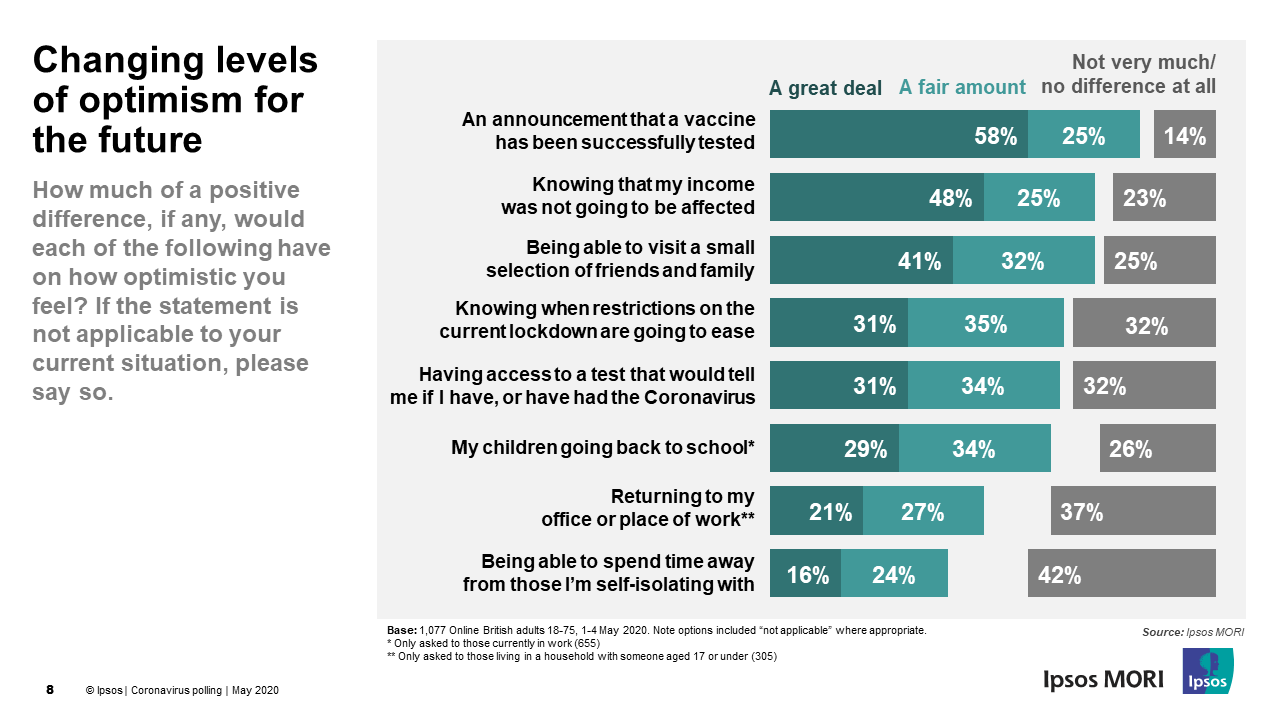6 in 10 Britons struggle to stay positive about the future, but this could be changed with a vaccine
In new polling by Ipsos, 58% of Britons say they are finding it harder to stay positive about the future compared with before the coronavirus outbreak, and over half (54%) are struggling to stay positive day-to-day. Women, in particular, are finding it harder – 61% of women say they are finding it harder to stay positive day-to-day, compared with 47% of men. The survey was conducted online, among Britons aged 18-75, over the weekend.
However, 83% of Britons say the announcement of a successful vaccine would make a positive difference to how optimistic they feel. This would make the most difference among those aged 55-75. Nine in 10 (90%) of this age group would feel more optimistic should such an announcement be made, 8 in 10 18-54s feel the same way.

Three-quarters (73%) say they would feel more optimistic if they knew their income wouldn’t be affected (rising to 80% of 18-34-year olds). Three in four would also feel more positive about the future should they be able to visit a small selection of friends and family.
Two-thirds (66%) of the British public would be able to feel more optimistic if they knew when the current restrictions are going to ease (rising to 74% of 18-34-year olds). Sixty-four per cent would also feel more optimistic if they were able to take a test to tell them if they have, or have had, Covid-19. Whilst two-thirds (63%) of parents might find it easier to see the light at the end of the tunnel if their children went back to school.
Two in five are desperate to escape those they’ve been cooped-up with – 40% think that spending time away from those they’re self-isolating with will have a positive difference on their outlook while 42% believe this will make little change, if any. Young people are twice as likely to find this appealing than older groups (57% of 18-34s vs 27% of 55-75-year olds).
Half (48%) of workers think returning to their place of work will have a positive difference on their mental outlook, and again this increases among young people. Fifty-six per cent of those at the start of their careers, aged 18-34, think going back to the ‘office’ will help with their positivity while only 40% of 55-75s feel the same.
Gideon Skinner, Head of Political Research at Ipsos, said:
There is little sign the impact the coronavirus pandemic is having on people’s wellbeing and their outlook is getting much easier. But there is light at the end of the tunnel – advances on the big questions such as developing a vaccine, being able to reassure people about their incomes, and allowing even a small amount of mixing with family and friends could all lift the public’s mood. It’s probably no coincidence that these are some of the hardest questions to answer, but even showing some movement could make a difference.
Technical note:
- Ipsos interviewed a representative sample of 1,077 British adults aged 18-75 online between 1st and 4th of May 2020. Data are weighted to the profile of the population






